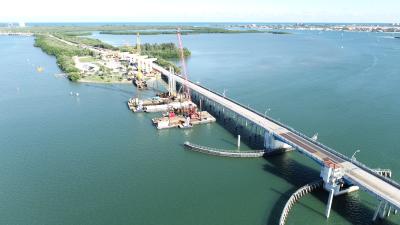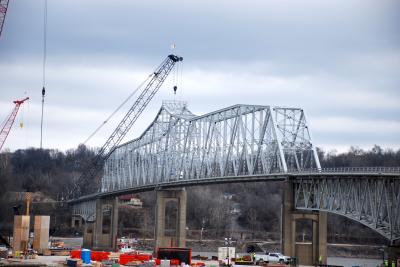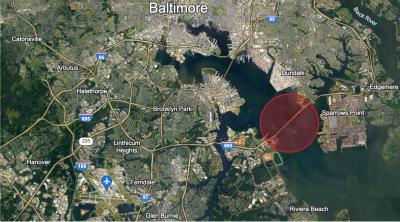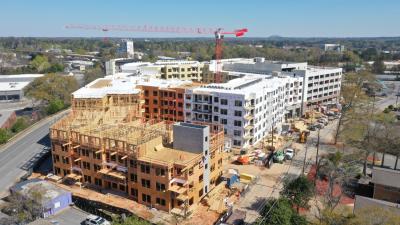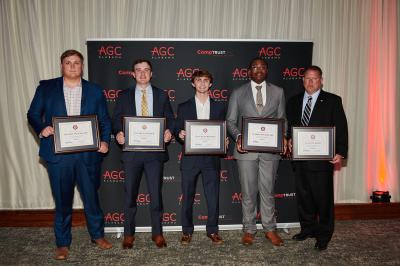On the second anniversary of the Sept. 11, 2001, terrorist attacks, the white dome of the U.S. Capitol, a symbol of hope and unity, stood against the blue sky of a gorgeous September morning in Washington, D.C.
Inside the nearby Grand Hyatt Hotel, the annual convention of the American Road & Transportation Builders Association (ARTBA) struck its own note of urgency, hope and unity of purpose. Several hundred leaders from throughout the highway construction field heard speaker after speaker describe one of the most dramatic battles for highway and bridge funding in the nation’s history.
The battle involves the construction industry’s (and Department of Transportation’s) stated need for $375 billion in a new six-year transportation bill — approximately 60-percent more than the previous six-year authorization in the Transportation Equity Act for the 21st Century (TEA-21). ARTBA also advocates an increased user’s fee on motor fuel to help finance the new legislation, a new tax that the Bush Administration opposes at this time.
Congress must reauthorize a new six-year bill while balancing needs for alleviating economic-costly traffic congestion, and creating jobs, against a host of other problems, from prescription drug benefits for the elderly to rebuilding Iraq and Afghanistan.
Prayerful Opening
The 2003 ARTBA Chairman Tom Hill, CEO of Oldcastle Materials Inc., Washington, D.C., opened the meeting with a somber reminder.
“Today’s date will be emblazoned on our hearts and minds forever,” he told attendees. “Two years ago, we were at our mid-year meeting in Tucson, AZ, when the news of the attacks came in. We spent several days in prayer and sorrow after that. Every one of us remembers where we were on that day. Let’s take a moment of silent prayer for the victims and their families.”
Then, after the U.S. Marine Corps color guard presented the colors, James R. Madara, ARTBA treasurer and senior vice president of Gannet Fleming Inc., Allentown, PA, gave the invocation, “Bless us with the wisdom we need to produce the transportation system we all want.” he said.
’Battle Royal’
Speakers from the Senate, House of Representatives and industry then presented frank views of what ARTBA President Pete Ruane described as “a battle royal” for adequate funding.
Hill turned on the energy, “President Harry Truman, a one-time ARTBA member, said, ’I never gave anybody hell. I just told the truth and everyone thought it was hell.’ That’s where we are. We are 20 days from the end of TEA-21 and we have no bill. We need an extension of six months [in TEA-21 authorization]. It’s very important that we get things done right; meaning $375 billion for highway and transit investment over the next six years, and we will settle for nothing less.
“These are very hard choices; this is a difficult sell,” Hill continued. “If it’s okay to spend $87 billion to rebuild Iraq, its got to be okay to spend our full amount to relieve congestion and create jobs, which citizens of this nation support.
“I truly believe federal highway spending really drives most of the other investment by state and local government. Although it’s 50 percent of the total [highway] investment, it really drives 60, 80 or 90 percent. So the decision before Congress really says what our business will be like for the next six years. It has been a really hard year, and I’m not sure the industry can take another six years of this. We cannot afford to fail.”
Young Backs Gas Tax
Rep. Don Young, R-AK, chairman of the House Transportation & Infrastructure Committee, is leading the push for the $375-billion proposal, and an increase in the tax on motor fuels. ARTBA President Pete Ruane said in introducing him as the featured speaker at the meeting: “This is our champion. This is the man we follow into battle.”
Young said in his talk that the House bill, still being drafted, is “right for the industry, right for the economy, right for the future,” adding: “If we don’t raise the money, the Highway Trust Fund [HTF] will be broke in 2007 and we will have a nation that cannot compete globally and we will not have the economy that is necessary for future generations. The key to a sound economy is a robust infrastructure within the nation. We do not have that today. It’s becoming worse each day, each minute, each hour, each month and each year and this nation, and our leaders, have to wake up to that fact.
“Unfortunately, there are those who say we can do it at a later time. We are in debt. We are engaged in war. I say, yes, that is true, but the people will support what we are trying to do because they can see the result as a direct response to their contributing to an infrastructure system. They cannot see Iraq. They cannot see the tax cuts in reality. They cannot see those things, which we are being told will solve the economic problems of this country. But they can see roads. They can see bridges. They can see airports. And they can see the fact that they can get to work on time because they are sitting in traffic and losing over two weeks time at work.
“This has been a tremendous battle and I can tell you I have the privilege of direct contact with the leadership just about every day and right now they’re not real happy with me. I take that as a great honor because this is my job (applause) … I think it’s time the White House and its gurus understand the importance to this nation of being able to move our people and our products so we improve the economy.”
Young received the ARTBA Award at the end of the session, as “the public sector individual who has demonstrated strong leadership and commitment to improve the nation’s transportation system.”
Backs Indexing for Fuel Tax
Young backs indexing user fee increases, with 1993 purchasing power as the index base. This would mean a 5.4-cents-per-gallon increase the first year of the tax.
Accounting for subsequent inflation, indexing would mean that federal gas taxes would rise approximately one-half cent per gallon each of the succeeding years, with the increase totaling 8.5 cents at the end of the six-year bill, so that the federal tax would be 26.9 cents per gallon by 2009.
Asked if President Bush would support an increase in the tax on motor fuels after the 2004 election, Young said, “I can’t speak for the President. I had a good meeting with Andy Card and he is very supportive of what I am trying to do.”
He said opponents of the tax had “a campaign-intellectual mindset and I really don’t think they know what they’re talking about … I’m hoping that within this next six months they will see that there is a necessity for this legislation. At that time, I’m sure someone will suggest to the President that maybe this is the right thing to do. I have told them very honestly, you can say you are against it [an increase in the tax]. Just wink at me and I’ll be at the front of this because I know the public will support me because this is the public’s money. Let me be the villain. I’m hoping that within the next six months we will have either a wink and a nod or a yes from the White House.”
Young said he would “personally try to promote the idea of a user fee directly responsive to the amount of miles you put on the car. You file it [the mileage] on your income tax. Senior citizens who can’t drive would pay very little. We have to look down the road.”
Young urged attendees, “Make your people call, write, and get on the phone to let them [congressmen] know that in fact this is a crucial part of the legacy we leave behind.”
The Bush Administration has proposed a $247-billion appropriation, including $46 billion for public transportation. The U.S. Senate is proposing $255 billion. Attendees were told that Sen. Jim Inhofe, R-OK, chairman of the Senate Environment and Public Works Committee, “hopes to have a Senate bill this year, but the likelihood of that happening is 50/50 at best.”
Young’s proposal would create 1.3 million jobs and greatly reduce congestion. Meanwhile, a proposed Federal Aviation Program Reauthorization Bill would reauthorize $60 billion to increase airport construction investment over the next four years.
This bill would create an estimated 665,000 jobs. (The Department. of Transportation says every $1 billion in federal highway investment creates 47,500 new jobs and generates more than $2 billion in economic activity.)
Deadline Time
The deadline for reauthorizing TEA-21 with a new six-year bill is Sept. 30, the end of the 2003 fiscal year. Congress won’t make that deadline.
The House of Representatives wants a six-month extension of TEA-21. Its proposed Fiscal 2004 appropriation (within the Appropriations Bill) would include $33.8 billion ($2.2 billion more than the current year) for highways, $7.2 billion (the same as the current year) for transit, $3.4 billion (also the same as currently) for airports and $900 million for Amtrak (the same as the Administration’s proposal). The funding, under the extension, would allow work to continue to provide some stability for contractors.
The highway funding is $4.5 billion more than the President’s request of $29.3 billion. An Administration statement expresses concern over the higher funding level, which it said “cannot be sustained in the long-term by current revenues to the Highway Trust Fund and likely would lead to a gas tax increase, which the Administration strongly opposes.”
The Senate bill would provide roughly the same funding as the House, but raises Amtrak funding to $1.8 billion.
Jeff Squires, staff person for Sen. Jim Jeffords, I-VT, a member of the Senate Environment and Public Works Committee, told the meeting that the Senate is seriously considering proposing a five-month, rather than six-month extension of current authorization.
“Five months vs. six months is important in terms of business days,” he told the meeting. “It allows time to plan and bid-let your work. It boils down to dollars and cents.”
Squires said that formula issues (the mode of distribution of federal funds to the states) “can become very divisive” and that Sen. Inhofe “has a strategy for the formula issue; we think we can solve that [the minimum guarantee quota].”
Need for Consistency
The extension in authorization is seen as important in allowing the contracting process to continue uninterrupted.
“It’s very important the flow of federal highway funding be predictable and manageable,” Larry C. Tate, president and managing director of Caterpillar Global Paving in Minneapolis, MN, told Construction Equipment Guide (CEG). “If you’re providing equipment to contractors, it all starts at the other end, with things like engineering and fast approval on environmental issues being converted into work. Unless you have predictability in the funding process, you could end up with a lot of volatility, job insecurity rather than job security.
“Delays can disrupt the process. It’s not so much the actual money that is being interrupted, but delays affect people’s perceptions so that they hesitate to make capital investments.”
Asked about the six-month extension, Tate said, “It is important that Congress take action to ensure that federal highway and transit funding continues after TEA-21 expires on September 30. We support a six-month extension of the highway program, but believe that Congress should come back next year to complete work on the six-year, needs-based $375-billion highway and transit TEA-21 reauthorization investment proposal being pushed by Don Young and Jim Oberstar [D-MN], ranking member of Young’s committee.
“The plan is right for America and for the transportation construction industry.
“It will modernize our transportation system, create jobs, reduce traffic congestion and improve safety and quality of life for all Americans.”
Gap in Funding
Eugene McCormick, ARTBA’s northeastern region vice chairman (and senior vice president of Parsons Brinckerhoff in Alexandria, VA), moderated the initial session on TEA-21 reauthorization. Following the session, McCormick told CEG, “It’s primarily a funding question. Clearly we believe in the fundamental importance of our transportation system to our nation’s economy in the long term and jobs in the short term. Today’s revenue sources are not keeping pace with the increasing demands of our system. We need to invest more and protect our system, and, yes, that requires a user fee increase. We believe strongly that a user fee is the best way to finance the program. Many understand the gap and the shortfall between needs and revenue; on the other hand, the political will to support a user fee increase quite frankly doesn’t seem to be there today.”
McCormick told CEG that a user’s fee increase is “not a sure thing.” Should this proposal fail, he said, “We begin to lose momentum,” but he added, “We’re not going to stop our fight. We ultimately expect to be successful and we’re not going to give up easily.”
Can transportation funding increase without a gas tax? “Yes, there can be marginal increases,” McCormick said. “You heard proposals this morning for a tax on gasohol. Yes, there can be some progress without a tax increase, but it is not adequate progress.” McCormick said ARTBA’s analysis of needs vs. funding is as follows:
“Today’s highway program is about $32 billion a year at the federal level. We need a 50-percent increase to nearly $50 billion just to be able to maintain the integrity of that system. We need to nearly double that investment if we are going to make inroads in the backlog of congestion and safety problems across the country. ARTBA’s position is in between that 50 percent increase and that doubling in order to have a responsive program.”
Does ARTBA feel that the Administration’s proposal is enough? “No, the President’s proposal basically is status quo,” McCormick replied. “It leaves us farther behind.”
How about the Senate’s proposal? “The Senate’s proposal at least takes a step in the right direction, but still falls short, in our judgement, so we’ll keep fighting the fight to do what we should do for the long-term interests of our transportation system.”
How would he characterize the status of the present transportation system? Is it at a crisis point? “No. We have made inroads in terms of the integrity of the system over recent years — small, but at least proven, inroads. We need to be able to continue that. Our revenue base is not a function of either the demands or the cost of that. We need to make that linkage.”
Bush Opposes Tax
Several speakers reconfirmed that the Administration opposes any increase in the federal tax on motor fuels until after the November 2004 presidential election.
“The President will be advised that this is a tax increase and he will veto it,” said Ruth Van Mark, deputy staff director for transportation of the Senate Environment and Public Works Committee. “The challenge is: What will happen if that [veto] package gets to the floor? Could the House and Senate override that? A lot of Republican senators are very nervous about bucking the President on this issue. I doubt that our leadership will allow us to bring the tax increase to the floor at this time. That may change as we get closer to the election and the job situation becomes much more pronounced.”
Participants said that substantially increasing the six-year funding is essential to any tax increase.
“Until we get a heavy-lift bill, nobody will support a tax increase,” was one comment during a question and answer period.
Sen. George V. Voinovich, R-OH, pointed out that the last fuel tax increase, from 14 to 18.4 cents per gallon, was in 1993, under President Bill Clinton.
“I think we need a public works bill right now,” Voinovich said. “This is all about jobs, jobs, jobs.”
Voinovich also advocated putting the 2.5-cents-per-gallon from the 13.4-cent tax on ethanol, a corn-based fuel, into the Highway Trust Fund instead of the General Fund. This step would add approximately $600 million a year to the HTF. (Another proposal in the Senate would put the five-cents difference between the ethanol tax and gasoline tax into the trust fund.)
Voinovich, former chairman of the National Governors Association and former mayor of Cleveland, OH, struck another poignant note on this 9/11 anniversary.
“After 9/11, our actions must be on-going and extensive,” he said. “I attended a meeting with Gen. Tommy Franks in Iraq. A trio of 9/11 family members also attended. They presented a piece of Sept. 11 steel to General Franks. Tears streamed down his face and I put my arms around him and tried to comfort him for all of us. I know we’re here to think about highways but this is an anniversary we will never forget.”
“Just think what President Bush has on his plate,” he added. “Iraq, North Korea, Afghanistan make it very difficult for President Bush to concentrate on anything else.
Somehow he has been able to do all that. It’s an uphill battle. We’re more involved in the world than anytime in my memory. We ought to pray for the President of the United States.”
Bonding Question
Diane Duff, director of economic development and commerce for the National Governors Association in Washington, D.C., discussed industry proposals to establish a private transportation finance corporation that would be given the authority to float $80 billion in tax-exempt bonds. $20 billion of this would go into a sinking fund to pay back the bonds over 20 or 30 years.
Duff said several governors are interested in this proposal, which had come from the American Association of State Highway and Transportation Officials (AASHTO).
“That’s the proposal that we’re looking at,” she told CEG. “Several governors are interested; several are concerned about it; the rest are where we all are, trying to figure out things. And I think there’s a significant political problem. This would add funds to the transportation authorization, and anticipates eventually looking at a gas tax increase.”
ARTBA’s McCormick said that ARTBA has discussed the bonding proposal with AASHTO and “would support it as a supplementary method, but not as a central mechanism.”
Others participating in the session said that President Bush and the Department of the Treasury feel the bonding step would significantly raise costs, so that there is “significant opposition to bonding in the Administration.”
In his talk, Rep. Young said, “Bonding will work, but it’s extremely expensive dollars. You don’t get the bang for the buck, which you should get. It will cost more than a direct user fee.”
Today's top stories



